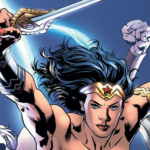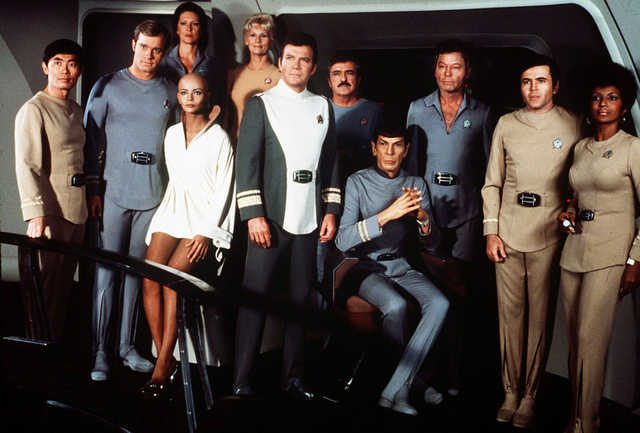
Star Trek turns fifty years old today. Fifty. That’s an incredible feat for a show that lasted only three seasons. The endurance of the franchise can be found in the journey of the characters. A major theme throughout the series, and indeed part of Starfleet’s objective, is to “seek out new life” in the cosmos and develop mankind’s understanding of the universe, which the Enterprise crew did every week until the show’s cancellation in 1969. After nearly a decade of false starts, broken promises, and countless petitions, the original crew finally reunited in what was to be the Enterprise’s greatest journey: the big screen.
Star Trek: The Motion Picture opened in theaters in 1979 and while it was financially successful, it left many critics and fans cold. Where was the sense of adventure, the excitement, and the humour that was prevalent in the original series? At this point, we were living in a post-Star Wars world. Lightsabers and blasters were way cooler than phasers ever were. When The Motion Picture opened, it was the antithesis of everything Star Wars was, and this was very much by design. Trek’s creator Gene Roddenberry wanted a bigger story, something more cerebral, more akin to 2001: A Space Odyssey. And like it or not, that’s exactly what we got.
I first experienced the film when I was ten years old and though I didn’t fully understand the plot, I loved what I saw. The Motion Picture gets a pretty bad rap, as do most of the odd-numbered films in the franchise. In an episode of The Big Bang Theory, Sheldon Cooper declares it’s the worst of the Trek films, even worse than The Final Frontier. In the years since my first viewing, I’ve stood by the film and defended it to even the most die-hard naysayers. You could say I’ve been preparing for this moment most of my life.
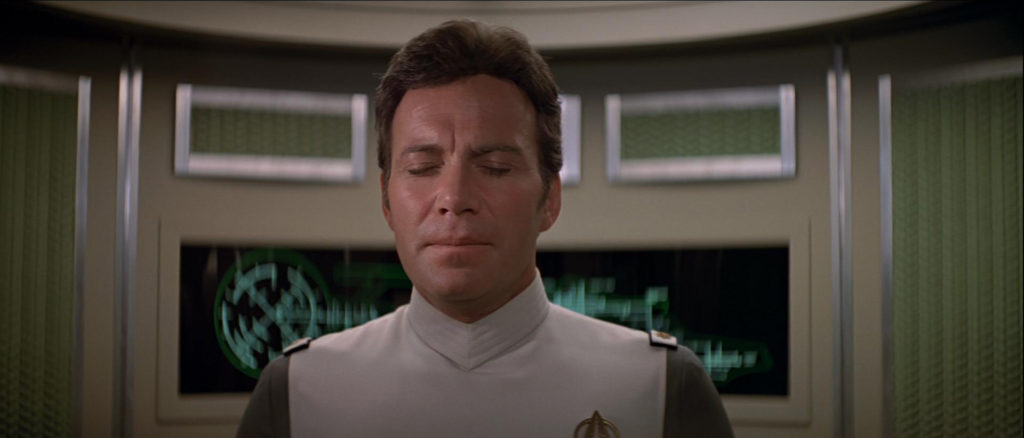
Despite its flaws (the less said about costumes, the better), there are so many great things in this film. From the very first notes, Jerry Goldsmith’s opening theme is epic and exciting; in fact, the entire score is great. All our favourite characters are back, and while many aren’t given much to do, it’s refreshing to see them all again. I actually love William Shatner in this; his Admiral Kirk may come off as a jerk to some, but I see him more as a man deep into a midlife crisis. James Kirk’s adventuring days are over, he is no longer the captain of the Enterprise and he’s seeing his beloved ship in the hands of new, younger commander. So like the jealous boyfriend he is, Kirk sees an opportunity to take back his girl and play the swashbuckling hero once more, and so he does. Only this time he’s not facing off against Klingons, or Romulans, or even Space Lincoln. He’s facing an unknown threat that could destroy Earth and everything in its path. No pressure there.
Kirk is not the only character at a crossroads in his life. Spock, having retired from Starfleet, has returned to his home planet of Vulcan in an attempt to renounce his human side. He’s the first of the original cast that we see and when he enters the film he’s in the final stage of kholinahr, a ceremony to purge himself of all human emotion. During this, he senses V-ger’s consciousness and fails the final test. Eventually this failure leads him back to the Enterprise, though it takes a while for him to show back up again.

The movie is slow, I’ll admit. It takes nearly an hour for the entire crew to be assembled but once Spock takes his place on the bridge, the real adventure begins. It’s a weird, heady adventure to be sure, but that’s the point. The ship and her crew are heading straight into the unknown: a seemingly unstoppable cloud-like being called V-ger, that has destroyed everything in its path and is heading toward Earth. But here’s the thing about V-ger: it’s not a villain. It’s not some evil force looking to destroy and conquer. At its core, V-ger is a child looking for its mother. We learn late in the film, that V-ger actually stands for Voyager, and was created on Earth hundreds of years prior and has since evolved into a being of unspeakable power, but limited awareness. It wants to know what it is, and more importantly why it exists, so it’s heading to Earth to find its Creator.
V-ger, like Kirk, is in the middle of a crisis of its own, one that is purely existential. It sees technology as the dominant species of the universe and regards humans as an infestation that hinders technological progress. In the end, V-ger can only be stopped by evolving once more, and to do so it must experience that which it has never known (or perhaps rejected): human emotion. In the film’s climax, this is obtained by Kirk’s would-be replacement Commander Decker and his love-interest Lieutenant Ilia (who was killed earlier in the film but then replaced by one of V-ger’s probes. It’s… complicated.) when they merge with V-ger, allowing it to evolve somehow and all three seemingly perish, leaving Earth to survive another day.
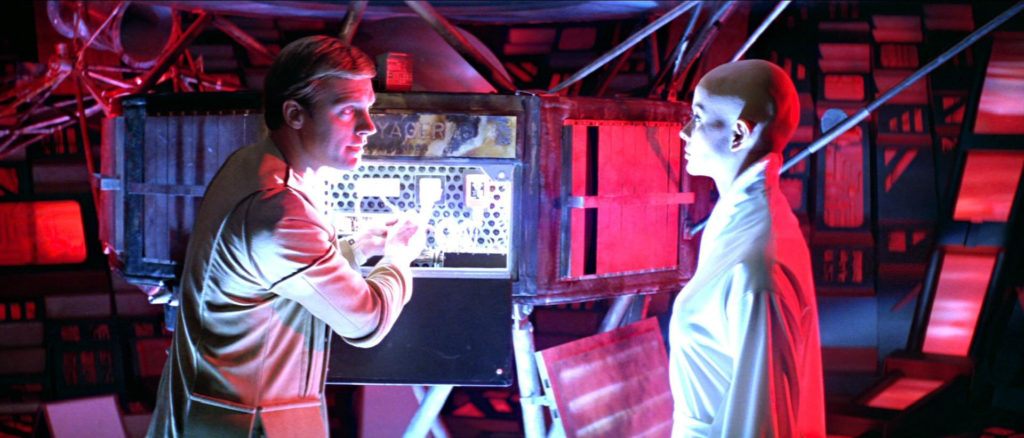
It sounds like a complicated mess, which it is at times, primarily because of the constant rewrites during filming and the fact that the film had no definitive ending planned. Despite the story problems, the film is not the incoherent mess it’s made out to be. Rather, it’s a gorgeously filmed parable about what it means to be human. Kirk and crew travel the stars searching for new life forms, new civilizations, to expand their knowledge and in doing so, face an enemy that is essentially trying to do the same thing. Even if it does involve disintegrating a few Klingons along the way. The deliberately slow pacing, coupled with Goldsmith’s score makes it feel like a genuine space opera. The later films in the series would find success with epic space battles, scenery-chewing villains, and time-traveling whales but this first entry sets out to tell a much bigger story about the human experience.
The film ends with the text, “the human adventure is just beginning.” Star Trek: The Motion Picture is an adventure, albeit a sometimes silly, confusing one, but one that is also pure, unadulterated science fiction. It may not be for everyone, but I love it. And it’s still way better than The Final Frontier.
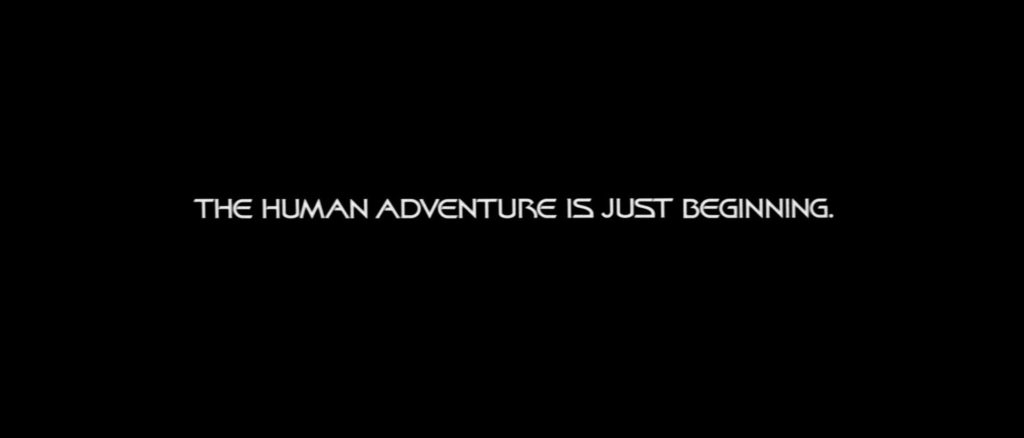

![[PODCAST] THE COMICS AGENDA: THE KING OF SELF-QUARANTINE](https://geekd-out.com/wp-content/uploads/2017/10/comics-agenda-banner-150x150.jpg)
